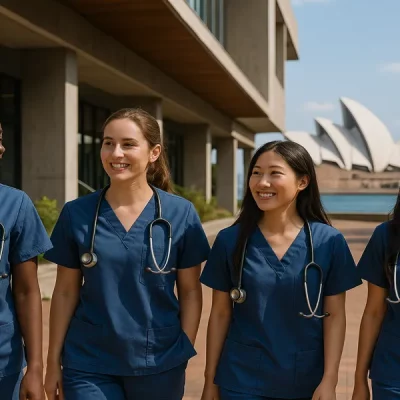Masters in Nursing in Australia: Top Universities, Fees & Admission Requirements
Table of Contents
Thinking of taking your nursing career to the next level? Studying a Master’s in Nursing in Australia could be your perfect path! With various top universities a growing demand for healthcare professionals, and excellent post-study work opportunities, Australia is a top choice for international nursing students in 2025.
Whether you’re dreaming of working in public hospitals, mental health clinics, or aged care, an Australian nursing degree opens doors to a rewarding future—and even permanent residency. So, if you’re ready to gain practical experience and earn a respected qualification let’s dive into everything you need to know—from top universities to costs, scholarships, and jobs after graduation!
Why Study a Masters in Nursing in Australia?
If you’re considering building your career in healthcare, Australia is one of the best places to pursue a master’s in nursing in 2025. With top universities, an acute shortage of skilled nurses, and direct Permanent Residency (PR) pathways, Australia offers not just an education—but a future.
According to the Australian Government’s Job Outlook, the healthcare and social assistance sector is the largest and fastest-growing industry in the country, expected to add over 250,000 new jobs by 2026. Nurses are among the most in-demand professionals, with Registered Nurse (RN) listed on the Medium and Long-term Strategic Skills List (MLTSSL), making graduates eligible for skilled migration. Following are the key details of studying master’s in Nursing in Australia:
| Feature | Details |
| Global Recognition | Degrees accredited by AHPRA/NMBA, accepted worldwide |
| Job Opportunities | High demand in public hospitals, private clinics, aged care |
| Average RN Salary | AUD 80,000 – AUD 110,000/year (post-master’s) |
| Post-Study Work Visa | 2–4 years (Subclass 485 Visa) |
| PR Pathways | RN is on the Skilled Occupation List (MLTSSL) |
| Flexible Work Rights | 48 hours/fortnight during studies; full-time in holidays |
| Work-Integrated Learning | Most programs include clinical placements in hospitals |
Top Universities for Master’s in Nursing in Australia [2025 Rankings]
If you’re wondering which university is best for a Master’s in Nursing in Australia, you’re not alone. With global rankings rising each year, Australia’s universities have become a magnet for international students looking to combine academic excellence with practical learning.
In fact, six Australian universities are ranked among the top 25 globally for nursing in the QS World University Rankings 2025, a testament to the country’s reputation in health education and clinical research. Many of these universities also have strong partnerships with hospitals and healthcare networks, offering internships, placements, and research opportunities as part of the degree. Below are the best Nursing Colleges in Australia for 2025:
| University | QS World Ranking 2025 (Nursing) | Top Nursing Courses Offered | Location |
| University of Sydney | #18 | Master of Nursing, Advanced Nursing Practice | Sydney |
| Monash University | #20 | Master of Advanced Clinical Nursing | Melbourne |
| University of Melbourne | #21 | Master of Nursing Science | Melbourne |
| University of Queensland (UQ) | #22 | Master of Nurse Practitioner | Brisbane |
| University of Technology Sydney | #23 | Master of Advanced Nursing | Sydney |
| Deakin University | #24 | Master of Nursing Practice | Geelong |
Eligibility Criteria for Master of Nursing in Australia for International Students
Thinking of applying to a Master’s in Nursing program in Australia in 2025? Great choice! But before you dive into the application process, it’s important to know if you meet the academic, language, and professional prerequisites. While master of nursing eligibility in Australia may vary by university, most institutions follow a common framework for admissions.
Over 30% of international applicants to Australian nursing master’s programs in 2023 were declined due to not meeting the IELTS 7.0 language requirement, highlighting the importance of solid English proficiency. Below are the key details of eligibility criteria for doing master’s in Nursing:
| Requirement | Details |
| Academic Qualification | Bachelor’s degree in Nursing or a related health science (usually 3–4 years) |
| Registration (if needed) | Current RN registration (for advanced or postgraduate clinical courses) |
| English Proficiency | IELTS 7.0 (no band less than 7.0) / TOEFL iBT 94 / PTE 65+ |
| Work Experience | 1–2 years of clinical experience preferred (not mandatory for all programs) |
| Additional Documents | Resume, SOP, 2–3 Academic or Professional Reference Letters |
| Age Requirement | Minimum age: 18 (Some unis may have no upper age limit) |
Nursing Courses in Australia for International Students in 2025
Planning to pursue a master’s in nursing in Australia? You’ll be happy to know that the country offers an impressive variety of nursing specializations, each designed to help students deepen their clinical expertise and prepare for advanced healthcare roles both locally and globally. From general Master of Nursing Practice programs to highly focused tracks like Mental Health Nursing, Critical Care, and Nurse Practitioner, these courses combine theoretical knowledge with practical experience.
According to Nursing and Midwifery Board of Australia (NMBA) data, international enrolments in postgraduate nursing programs have grown by 12% year-over-year since 2020, showing the increasing demand and career potential in the field. Below are popular nursing specializations in Australia:
| Course Name | Duration | Top Universities Offering the Course |
| Master of Nursing Practice | 2 years | Deakin University, La Trobe University, Edith Cowan University |
| Master of Clinical Nursing | 2 years | University of Adelaide |
| Master of Nursing (Advanced Practice) | 1.5 – 2 years | University of Technology Sydney (UTS), Flinders University |
| Master of Nurse Practitioner | 1.5 years | University of Queensland (UQ), Monash University |
| Master of Mental Health Nursing | 1.5 – 2 years | University of Newcastle, Australian Catholic University (ACU) |
Cost of Studying Master’s in Nursing in Australia in 2025
When planning your journey to study abroad, tuition fees play a huge role in decision-making—especially for international students. The cost of studying a Master’s in Nursing in Australia typically ranges from AUD 35,000 to AUD 45,000 per year, depending on the university, course type, and city. Additionally, students should consider additional living expenses, which can range from AUD 21,000 to AUD 28,000 per year, depending on lifestyle and location. According to the Study in Australia government portal, international postgraduate nursing students spend an average of AUD 82,000–95,000 in total over two years, inclusive of tuition and living expenses.
Luckily, many Australian universities offer partial or fully funded nursing scholarships, reducing the financial burden significantly. You may also be eligible for a post-study work visa (subclass 485), which allows you to work in Australia after graduation and gain return on investment through employment. Following are the key details of cost of studying master’s in Nursing:
| University | Tuition Fee (per year) | Estimated Total (2 years) |
| University of Sydney | AUD 40,000 | AUD 80,000 |
| Monash University | AUD 38,800 | AUD 77,600 |
| Deakin University | AUD 35,200 | AUD 70,400 |
| University of Technology Sydney (UTS) | AUD 39,000 | AUD 78,000 |
| University of Queensland (UQ) | AUD 37,300 | AUD 74,600 |
Note: These fees are indicative and subject to annual changes. Always check the university website for updated fee structures.
Scholarships for Master’s in Nursing in Australia for International Students
One of the biggest concerns for international students is how to afford tuition fees and living costs while studying abroad. Thankfully, Australia offers a wide range of scholarships for Master’s in Nursing students, including fully funded options that cover everything from tuition fees to travel and monthly living allowances. These scholarships are offered by the Australian government, state departments, and leading universities, and are awarded based on merit, academic excellence, leadership potential, or financial need.
According to the Australian Department of Education, more than 3,000 international students received scholarships in health and nursing fields across Australia in the last three years alone. Following are the key details of top nursing scholarships in Australia for 2025:
| Scholarship Name | Coverage | Offered By |
| Australia Awards Scholarships (AAS) | Full tuition, return airfare, monthly stipend, OSHC | Australian Government (DFAT) |
| Destination Australia Scholarship | Up to AUD 15,000/year | Australian Department of Education |
| Deakin Vice-Chancellor’s International Scholarship | 100% tuition fee + mentoring support | Deakin University |
| Monash International Merit Scholarship | AUD 10,000/year (up to AUD 20,000 total) | Monash University |
| UTS International Postgraduate Full Tuition | Full tuition fee | University of Technology Sydney |
| University of Queensland International Scholarship | 25%–50% tuition fee | UQ School of Nursing and Midwifery |
Job Opportunities After Master’s in Nursing in Australia
If you’re wondering what happens after earning a Master’s in Nursing in Australia, the good news is—your career prospects are incredibly strong. Australia has one of the most advanced healthcare systems in the world and is currently facing a critical shortage of skilled nurses, especially in specialized areas like aged care, mental health, and advanced clinical nursing.
According to the Australian Government’s Labour Market Insights 2024, the number of job openings for registered nurses is projected to exceed 100,000 by 2027, making nursing one of the fastest growing and most secure professions in the country. Following are various nursing jobs in Australia after master’s alongside their average salary:
| Role | Average Salary (AUD/year) | Demand Level (2025) |
| Registered Nurse (RN) | 80,000 – 100,000 | High |
| Nurse Practitioner | 110,000 – 130,000 | Very High |
| Mental Health Nurse | 90,000 – 105,000 | Medium–High |
| Clinical Nurse Specialist | 95,000 – 115,000 | High |
| Aged Care Nurse | 85,000 – 100,000 | High |
Conclusion
Pursuing a Master’s in Nursing in Australia isn’t just about getting a degree—it’s about building a future full of global opportunities, career growth, and personal transformation. From highly ranked universities like the University of Sydney and Monash to generous scholarships and PR pathways, Australia checks all the boxes for international nursing students in 2025.
Frequently Asked Questions
What are the best universities for a Master’s in Nursing in Australia in 2025?
Some of the top-ranked universities for nursing in Australia include:
1. University of Sydney (#18 in QS World Rankings for Nursing)
2. Monash University (#20)
3. University of Melbourne (#21)
4. University of Queensland (#22)
5. University of Technology Sydney (UTS) (#23)
6. Deakin University (#24)
These universities are globally recognized and offer excellent clinical training and research opportunities.
What is the eligibility for a Master of Nursing in Australia for international students?
To study nursing in Australia, you typically need:
1. A Bachelor’s degree in Nursing or related health science
2. IELTS score of 7.0 (no band less than 7.0) or equivalent
3. Some courses require current RN registration
4. 1–2 years of clinical experience (preferred for advanced programs)
5. Supporting documents: SOP, Resume, and Recommendation Letters
How much does it cost to study a Master’s in Nursing in Australia?
The average nursing course fee in Australia ranges between AUD 35,000–AUD 45,000 per year.
Here’s an estimate for two-year programs:
1. University of Sydney: AUD 80,000
2. Monash University: AUD 77,600
3. Deakin University: AUD 70,400
4. UTS: AUD 78,000
5. UQ: AUD 74,600
Additional living expenses can range from AUD 21,000–28,000/year.
Are there any scholarships for international nursing students in Australia?
Yes! Popular nursing scholarships in Australia include:
1. Australia Awards Scholarships (full funding by DFAT)
2. Destination Australia Scholarships (up to AUD 15,000/year)
3. Deakin Vice-Chancellor’s Scholarship (100% tuition)
4. Monash International Merit Scholarship (up to AUD 20,000)
5. UTS Full Tuition Scholarship
Many scholarships are merit-based and reduce the overall cost significantly.
Can I get a job after completing a Master’s in Nursing in Australia?
Absolutely. Nursing jobs in Australia after a master’s are in high demand. Roles include:
1. Registered Nurse (RN): AUD 80,000–100,000
2. Nurse Practitioner: AUD 110,000–130,000
3. Mental Health Nurse: AUD 90,000–105,000
4. Aged Care Nurse: AUD 85,000–100,000
Graduates are eligible for a Temporary Graduate Visa (subclass 485) and may apply for PR pathways through the Skilled Occupation List (MLTSSL).
Is nursing a PR pathway in Australia in 2025?
Yes, nursing is on the Medium and Long-term Strategic Skills List (MLTSSL), which makes it a key occupation for skilled migration. After completing your degree, you can apply for:
1. Post-study work visa (485)
2. Skilled Independent Visa (189)
3. Employer-sponsored visas








